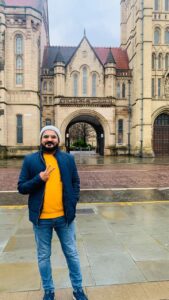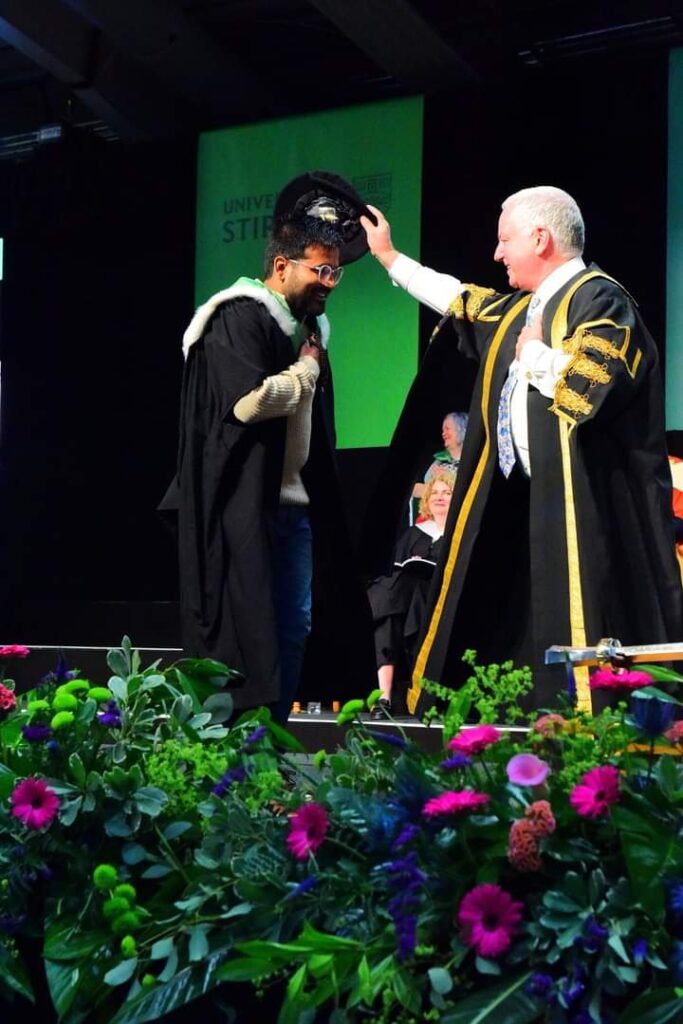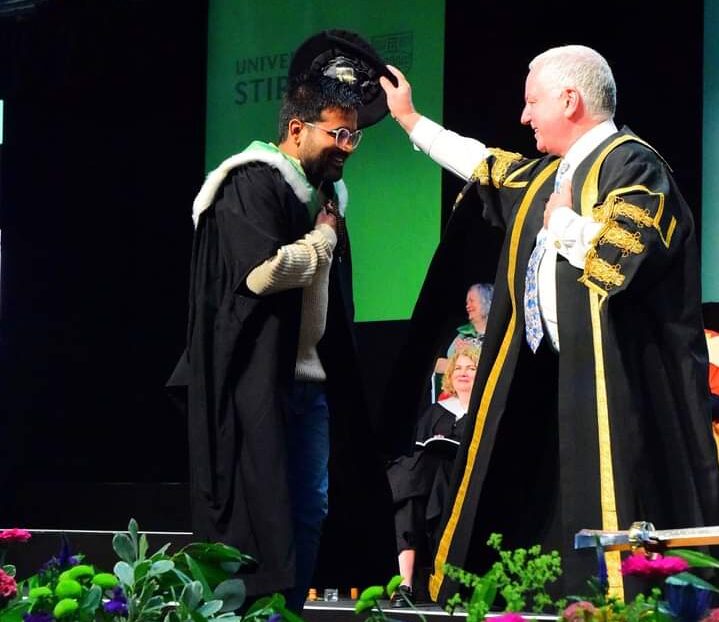Interviewer: First off, congratulations on your award, Muhammad! Can you tell us a little about the project that earned you the “Research-based Learning Prize”?
Muhammad Umair: Thank you! It’s an honour to receive this recognition. The project was for the Loch Lomond and The Trossachs National Park (LLTNP) Authority, where we analysed data from a visitor survey of 2,265 participants. Our goal was to draw insights that would help the park enhance visitor experiences and improve management strategies. By applying data analytics and statistical methods, we were able to provide the park with practical, actionable recommendations. What made the project particularly fulfilling was the fact that the data wasn’t just numbers—our insights could actually influence policy decisions and the visitor experience.
Interviewer: That sounds like a huge responsibility. How did you approach balancing the technical side of the project with the practical needs of the park authority?
Muhammad Umair: It was a careful balance. When you have such a large dataset, you can get caught up in the technical details—p-values, confidence intervals, and so on. But we made a conscious effort to keep the end user in mind. For us, it wasn’t just about uncovering trends but ensuring those trends were aligned with what the park authority could implement. For instance, we noticed certain facilities were underused, and we dug into the reasons behind that. Our focus was on turning data insights into real-world improvements.

Interviewer: You also founded “Club Analytica” at the University of Stirling. How did that experience come about, and what impact has it had on your academic journey?
Muhammad Umair: Club Analytica was something I initiated because I saw a gap between theory and practical application in data analytics. I wanted to create a community where students could get hands-on experience with real-world data problems. We organised workshops, had guest speakers from the industry, and even held competitions to keep it engaging. The club not only enhanced our technical skills but also helped build a network of like-minded people who were passionate about data. It’s been incredible to see how the club has grown, and I believe it played a crucial role in preparing many students, including myself, for the real challenges in the industry.
Interviewer: That sounds amazing. You also hold a Master’s in Public Administration from the University of Karachi and founded the ATI Karachi University Chapter. How did that chapter and your time in Pakistan shape you as a professional?
Muhammad Umair: My time at the University of Karachi was instrumental in shaping my leadership abilities. Founding the ATI Karachi University Chapter was a significant milestone for me. ATI focused on promoting awareness and civic engagement among students, and it helped me develop skills in organising, team-building, and leadership. The initiative was aimed at empowering students to contribute positively to society, and I think that sense of community responsibility has stuck with me throughout my career. Karachi taught me resilience and how to work efficiently in complex environments, which has been invaluable as I transitioned into the data and analytics field.
Interviewer: You’ve worked in digital marketing and data science for reputable software companies in Pakistan and Oman. How did those experiences prepare you for your work in the UK?
Muhammad Umair: My work in Pakistan and Oman, though I was working online, gave me a diverse perspective on how data science and digital marketing intersect in different cultural and business contexts. In Oman, I worked remotely with companies, helping them with their data-driven marketing strategies. Those experiences taught me to adapt to different working styles and client expectations. When I moved to the UK, I found the work culture more collaborative and innovation-focused. Here, there’s a lot of emphasis on using data to drive decision-making, which aligns perfectly with my background in analytics.

Interviewer: Speaking of the UK, you’ve mentioned having three exciting job offers—one from the Orkney Islands, one from Edinburgh, and one from London. That’s quite a range of choices. How are you approaching this decision?
Muhammad Umair: It’s definitely a big decision! Each offer has its unique appeal. Orkney is known for its tight-knit community and beautiful landscapes, which really speaks to my love for quieter, community-driven environments. Edinburgh is a vibrant city with a strong business and tech scene, and it’s also a great place to further my career in analytics. London, of course, is a global hub with unparalleled opportunities in data science and marketing analytics. Right now, I’m weighing up the lifestyle and professional growth each location offers, but regardless of where I choose, I’m committed to making a meaningful contribution to the community.
Interviewer: That brings us to your future plans. Where do you see yourself in the long term, both professionally and personally?
Muhammad Umair: My long-term goal is to stay in the UK and establish myself as a leading consultant in data science and digital marketing. I want to continue working on projects that not only have a business impact but also contribute to societal improvements, like the LLTNP project. Beyond professional success, I want to contribute to the community. Having been involved in student organisations, I know how important it is to give back. Whether through mentorship or local community projects, I want to be a positive force wherever I end up.
Interviewer: You seem very passionate about making a difference, not just in your work but also in your community. What motivates you to maintain this balance?
Muhammad Umair: I’ve always believed that success isn’t just about individual achievements—it’s about how you can lift others up along the way. During my time at the University of Karachi and then later at Stirling, I saw firsthand how community-building can create long-lasting change. Now that I’m in the UK, I feel a responsibility to contribute not only through my work in data but also by being an active member of the community. Whether it’s through volunteering, mentorship, or even just helping to foster a collaborative work environment, I want to make a positive impact.

Interviewer: That’s inspiring to hear. Finally, what advice would you give to young professionals who are just starting in the fields of digital marketing or data science?
Muhammad Umair: My advice would be to stay adaptable. Both digital marketing and data science are fields that evolve constantly. Keep learning, be open to new technologies, and don’t shy away from challenging projects. Also, don’t underestimate the power of networking. The relationships you build, whether in university clubs or the workplace, can open doors you didn’t even know existed. And finally, always remember the bigger picture—data is powerful because it can create real change. So, approach your work with purpose.
Interviewer: Thank you so much for sharing your journey, Umair. It’s clear that your passion and dedication will take you far. Best of luck with whichever job offer you choose, and we look forward to seeing the impact you’ll make in the UK.
Muhammad Umair: Thank you! It’s been a pleasure, and I’m excited about the future.











Comments are closed